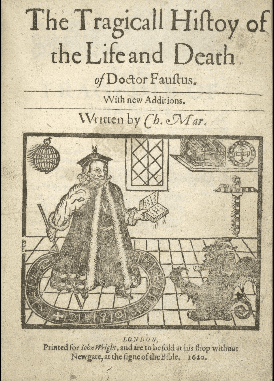 Now playing at the American Shakespeare Center is Christopher Marlowe’s Doctor Faustus, a familiar story of temptation and fall. Faustus’s greed for knowledge leads him to books on logic, medicine, law, and divinity, all of which he finds lacking. But in magic, the dark arts, he senses power. He decides to make a twenty-four year pact with Satan, to sell his soul for knowledge, power and pleasure – to hobnob with the powerful and play tricks on the weak.
Now playing at the American Shakespeare Center is Christopher Marlowe’s Doctor Faustus, a familiar story of temptation and fall. Faustus’s greed for knowledge leads him to books on logic, medicine, law, and divinity, all of which he finds lacking. But in magic, the dark arts, he senses power. He decides to make a twenty-four year pact with Satan, to sell his soul for knowledge, power and pleasure – to hobnob with the powerful and play tricks on the weak.
Sylvan Barnet, Fletcher Professor of English Emeritus at Tufts University, wrote: “We can say that Faustus makes a choice, that he is responsible for his choice, but there is in the play a suggestion – sometimes explicit, sometimes only dimly implicit – that Faustus comes to destruction not merely through his own actions but through the actions of a hostile cosmos that entraps him. In this sense, too, there is something of Everyman in Faustus.” Barnet muses that Adam, like Faustus, is responsible for his fall. Why then, since God knew that would happen, didn’t He create Adam “of better stuff?”
I’ll leave that question to theologians. What interested me was the mention of “a hostile cosmos that entraps…” Who among us has not felt at times that the world can be a dark and scary place?
In Anthony Doerr’s All the Light We Cannot See, Werner Pfennig is an orphan trapped in a coal-mining town in Germany during Hitler’s rise. His prospects seem bleak, but Werner is also an engineering prodigy, a talent that earns him a place in an elite school for Nazis training. By conforming to the prevailing culture, he sees a way out of the mines, but the price is his soul, his best friend’s future and the lives of many: Nazis resistors, the innocent and the weak.
As I read the book and saw the play, I couldn’t help but think about their choices, and whether given similar choices in similar circumstances I would have done better. While that is a comforting thought, I know I’ve made poor choices in far less hostile situations. As the actors playing the seven deadly sins of pride, greed, wrath, envy, sloth, gluttony and lust climbed out of the trap door in the middle of the stage at Blackfriar’s Theater last Saturday night, I asked myself, which tempted me? Which do I freely choose?
Oh yeah, there’s pride, um and maybe some greed, yup to wrath and envy, sloth… I needn’t continue.
Perhaps that’s one of the benefits of literature and theater. Experiencing others’ decisions might encourage us to examine our own and realize that free will gives us more choices than we realized.
I thought about that yesterday as my sons and daughter sent me good wishes for a happy Mother’s Day and shared kind words about the choices I’d made on their behalf. As children like Werner now adults like Faustus, they, too, have been and continue to be tested. I have no words of wisdom; in fact I never did.
All I can say is, “I love you,” freely and, when loving is harder, by choice – then show them as best I can.



0 Comments